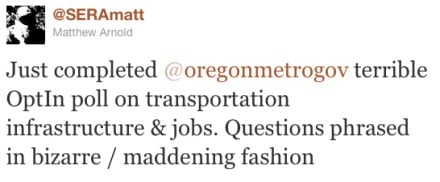Jobs and the economy need to be our focus, even if the environment suffers.
— Choice on a Metro Opt In survey
A Metro survey aimed at the 8,000 members of their Opt In Panel drew swift and critical reaction from active transportation advocates yesterday.
The survey was introduced as “some questions about infrastructure projects and economic growth in the Portland-metropolitan area.” Despite its intentions, the questions and phrasing rubbed some Opt In members the wrong way and they went to Twitter to share their reactions.
Paul Manson, a former environmental and sustainability planner at Parametrix, who’s now working on a PhD on public affairs and policy from Portland State University, had this reaction:

Matthew Arnold, an urban planner/designer with Portland firm SERA Architects, as well as Chair of the City’s Bicycle Advisory Committee, also shared thoughts on the survey:

Steve Bozzone, a citizen activist with Active Right of Way and board member of the Willamette Pedestrian Coalition tweeted about the survey several times. Here’s one of them:

What’s all the fuss about?
I’m a member of the Opt In panel and just finished the survey myself. I agree. There are some poorly phrased questions and false dichotomies.
My first quibble was with this question:
When it comes to transportation improvements in the region, which should be the top focus? (Select one)
– Bicycle lanes
– Sidewalks
– Light rail
– Regional roads and highways
– Neighborhood streets
– Don’t know
This question is troubling because the term “bicycle lanes” doesn’t accurately reflect the type of bicycling facilities we currently build. Bike lanes are 1990s technology and have been proven in many cases to be inadequate and unpopular — even with people who ride bikes! These days we build neighborhood greenways and cycle tracks and complete street projects. I want to see more and improved bike access in our region, but I don’t think “bike lanes” should be our “top focus.” Hopefully Metro won’t read results of this survey as meaning people don’t support bicycling.
The question also perpetuates divisiveness within transportation advocacy circles (a growing issue as budgets tighten). Our “top focus” should be roads and highways that give people choices in how they move around and that have adequate access for all modes depending on the roadway type and land use context.
And then there was this question: “Which of the following comes closest to your opinion? (Select one)”
– Environmental sustainability should be the region’s top priority, and businesses and individuals must learn to adapt to this priority. This needs to be our focus, even if our economy suffers.
– Improving the economy, creating family-wage jobs, and making the region more attractive to businesses is more important than environmental sustainability. Jobs and the economy need to be our focus, even if the environment suffers.
Who says that doing what’s good for the earth must be doing what’s bad for the economy?
One of the final questions asks people to choose between a good economic future for our children or a good environment for them to live in.
Why is Metro trying to make people pick sides in a battle where there are no winners?
Jim Middaugh, communications director for Metro defends the survey. “We’re attempting to provoke a bit and help decision makers get a sense of where different segments of the population are on these things.” On Twitter, he responded directly to criticisms by saying that the “Forced choice” the survey presents is a “technique to get at underlying values.” And he added that, “Metro gets that things aren’t black and white.”
“We’re trying to see how people are leaning… If you put a grey zone in there, it’s not as informative.”
There are options in the survey allowing people to choose “Neither” or “Don’t know” and to leave their own comments (and Middaugh said they’ll publish all the comments they receive); but the phrasing and choices show a troubling perspective at Metro. I hope they’re careful with what they extrapolate from this survey.
Did you take the survey? What do you think?

